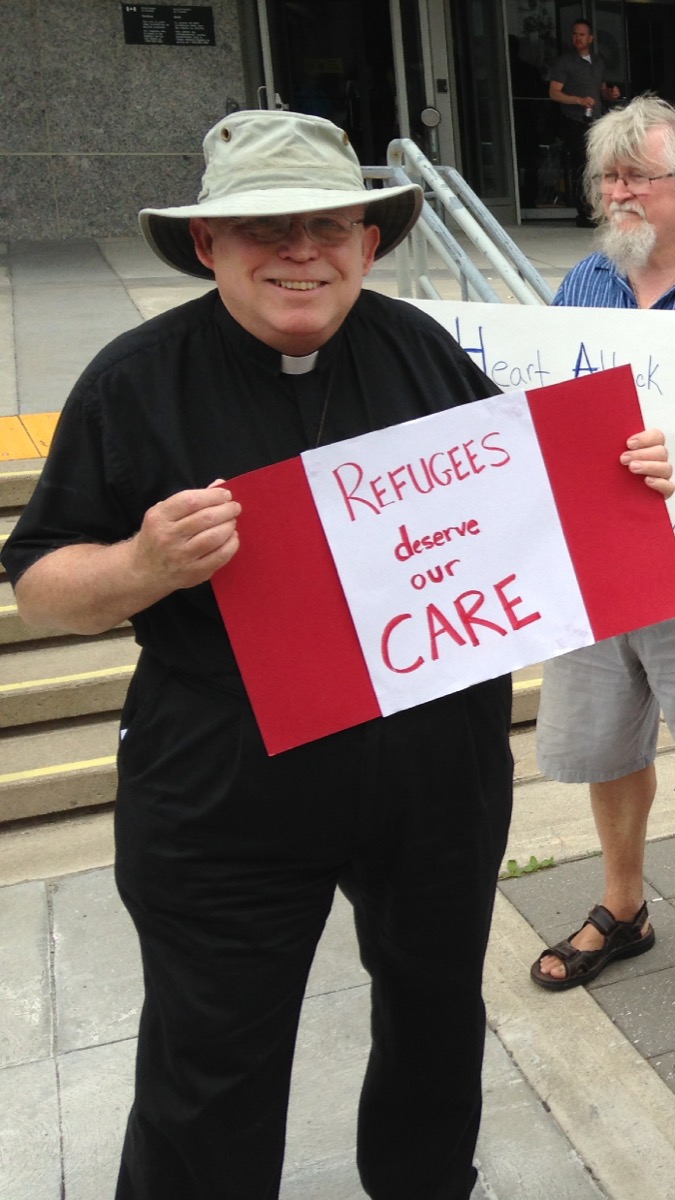The Federal Court of Appeal recently heard the Canadian government’s appeal of a decision finding that the Canada-US Safe Third Country Agreement (STCA) is unconstitutional. Amnesty International (AI), the Canadian Council for Refugees (CCR), and The Canadian Council of Churches (CCC) joined individual refugee claimants as their lawyers reiterated to the court that the STCA violates the right to life, liberty, and security of the person, as well as equality rights guaranteed by the Canadian Charter of Rights and Freedoms.
The Safe Third Country Agreement is a treaty between Canada and the United States which forbids anyone from claiming refugee status in one country if they originally came to the other country. “A refugee coming from their country arrives first in the United States and then wants to claim asylum in Canada,” explains Deacon Rod McDowell. “This person cannot make the claim in Canada (or vice versa) at a land border crossing unless they meet one of the exceptions listed in the agreement.”
This appeal was brought to the court just weeks prior to Refugee Rights Day which is observed each year in Canada on April 4. While Easter will take precedence this year, the day is an opportunity to bring attention to the advances made in the protection of refugee rights in Canada as a result of the Singh Decision of the Supreme Court of Canada, which found that the Canadian Charter of Rights and Freedoms protects the fundamental rights of refugees. Refugee Rights Day is also a time to learn about the threats to those rights, such as those arising from the Safe Third Country Agreement.
“Many refugee claimants are not safe in the US, and do not benefit from the same protection that they would receive in Canada,” said Ketty Nivyabandi, Secretary General of Amnesty International Canada. “In July 2020, the Federal Court ruled that sending refugee claimants back to the US, where they face detention and mistreatment, shocks the conscience of Canadians, and that being detained in the US exposes these refugee claimants to increased risks of return to persecution. We look forward to the Federal Court of Appeal reaffirming the strong legal conclusion drawn from the clear and extensive evidence that was before the Federal Court.”
The Niagara frontier, and especially Fort Erie, is the major border crossing point for refugees coming from the United States to Canada. “Prior to the implementation of the STCA, some 6,000 plus refugees would cross at Fort Erie in a given year,” says McDowell. “With the implementation and tightening of the STCA, and the effects of the pandemic, that number has now dwindled to about 900 in the last 12 months.”

Refugee protection in the US drastically deteriorated under the Trump administration, but many laws and policies that violate refugee rights pre-existed his administration, and will not be easily reversed by the new Biden administration. The Canadian Council of Churches and its partners, have been challenging the STCA since before it was signed and won a previous Federal Court ruling finding the US unsafe for refugees in 2007 (though this decision was subsequently overturned on appeal, based on a technicality).
Under the Biden administration, continuing concerns include:
Arbitrary detention of thousands of migrants and asylum seekers continues in the US’s more than 200 immigration detention facilities.
Arbitrary detention is routinely used by US authorities to undermine access to legal counsel and pressure asylum seekers into giving up their claim, thereby forcing them back to serious human rights violations in their country of origin.
White House Press Secretary Jen Psaki recently declared: “Now is not the time to come … the vast majority of people will be turned away. Asylum processes at the border will not occur immediately; it will take time to implement.”
At the Federal Court, the organizations submitted extensive evidence that the US system fails in many ways to protect refugees, and that people turned back from Canada under the STCA are at risk of being sent in turn by the US to face persecution, torture and even death in their home countries.
“Hospitality is a core value of Canadians and they expect people who are seeking protection in Canada to be received, welcomed, heard and treated with respect, not returned to face detention,” said Pastor Peter Noteboom, General Secretary of The Canadian Council of Churches.
Under the Safe Third Country Agreement, most refugee claimants who arrive at an official border post seeking protection in Canada are denied entry and turned back to the US. Because the agreement only applies at official border crossings, many refugees have been forced to cross the border in between ports of entry, sometimes in perilous conditions. Withdrawing from the Agreement would not only ensure that Canada meets its legal obligations, but would also allow people to present themselves in an orderly way at ports of entry, ending the need for irregular crossings.
With files from the Canadian Council of Churches


Euchre and the Meaning of Life